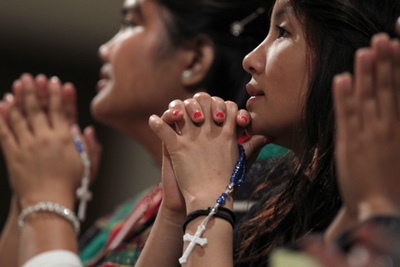Today's Stress Buster: God
Alessia Domanico
Tuesday, August 10, 2010
 University of Toronto Researchers Micahel Inzlicht and Alexa Tullet found that those who believe in and reflect on God, deal with stress and anxiety more easily in strenuous situations.
The study tested individuals to determine if thinking about religion would reduce their reaction to making mistakes. Test subjects were first asked to think about religion by writing about God. They then had to complete a word scramble with religiously themed words. After this they were given a tricky computerized test. The researchers monitored the subjects’ brain reactions when they made mistakes on the test.
The test found that believers experienced less distress when making an error. It also found that it didn’t matter what religious denomination the person belonged to. All that mattered was that they were reflecting on their belief and religion while taking the test. One researcher said that these small differences in brain pattern can lead to a calmer lifestyle. And God doesn’t even have to be the first thing on your mind, the result is achieved as long as you have experienced some form of reflection on your faith and spirituality. The researchers use the example of a person walking by a Church on the way to their bus stop. Dr. Inzlicht says:
University of Toronto Researchers Micahel Inzlicht and Alexa Tullet found that those who believe in and reflect on God, deal with stress and anxiety more easily in strenuous situations.
The study tested individuals to determine if thinking about religion would reduce their reaction to making mistakes. Test subjects were first asked to think about religion by writing about God. They then had to complete a word scramble with religiously themed words. After this they were given a tricky computerized test. The researchers monitored the subjects’ brain reactions when they made mistakes on the test.
The test found that believers experienced less distress when making an error. It also found that it didn’t matter what religious denomination the person belonged to. All that mattered was that they were reflecting on their belief and religion while taking the test. One researcher said that these small differences in brain pattern can lead to a calmer lifestyle. And God doesn’t even have to be the first thing on your mind, the result is achieved as long as you have experienced some form of reflection on your faith and spirituality. The researchers use the example of a person walking by a Church on the way to their bus stop. Dr. Inzlicht says:
Admiring (the) church en route could prime the religious thoughts that will take the sting out of noticing the bus has passed by.Interestingly enough, the test found the result was the opposite for subjects who did not believe in God or practice a form of organized religion. Non-believers demonstrated a heightened form of neural distress when they were made to contemplate God and then take the tricky test. The distress reactions only last mere milliseconds after making an error, but researchers say that they can add up over the course of a lifetime. While avoiding stress may be a positive thing, the researchers say it is also important to remember that a little anxiety is a good thing. The anxiety we experience after making a mistake will in theory, help prevent us from making it again in the future. While I’m relieved that my anxiety is teaching me something, I will be giving this test a try before my mad dash to the train this evening. Try it too and see what happens. If you’d like to learn more; the article on this study can be found in the latest edition of Psychological Science. - Photo: CNS photo/Nancy Wiechec
Related Articles:
Category: General Posts
Tag: belief, God, neuroscience, research, stress, University of Toronto
Pray with the Pope Reflection – June 2025
Friday, June 13, 2025
 Fr. Edmund Lo, SJ
Fr. Edmund Lo, SJ
In this month of June, the Holy Father invites us to pray that the world might grow in compassion, that each one of us might find consolation in a personal relationship with Jesus, and from his Heart, learn to have compassion on the world.
Chaplaincy: “Divine Coffee” for Students
Tuesday, June 10, 2025
 Gianpaolo Capozzi
Gianpaolo Capozzi
Gianpaolo gives us a behind the scenes look at his upcoming Behold segment on the York University Catholic Chaplaincy.
Pope Leo XIV’s homily for Pentecost Sunday 2025
Sunday, June 8, 2025
 Pope Leo XIV
Pope Leo XIV
On Sunday, June 8, 2025, Pope Leo XIV celebrated Mass for the Jubilee of Movements, Associations, and New Communities and spoke about how the Holy Spirit helps the apostles overcome "their fear, shatters their inner chains, heals their wounds, anoints them with strength and grants them the courage to go out to all and to proclaim God’s mighty works."
Homily of Pope Leo XIV at the Mass for the Jubilee of Families, Children, Grandparents, and the Elderly
Sunday, June 1, 2025
 Pope Leo XIV
Pope Leo XIV
Pope Leo XIV celebrated Mass for the Jubilee of Families, Children, Grandparents, and the Elderly and referred to Pope Francis and mentioned spouses who have been beatified and canonized, like the parents of St. Therese of the Child Jesus.
Looking back on Rerum Novarum
Monday, May 26, 2025
 Matthew Neugebauer
Matthew Neugebauer
Pope Leo XIV chose his name primarily to highlight his most recent namesake Leo XIII, whose "historic encyclical Rerum Novarum addressed the social question" to the challenges of his time. What concerns does the encyclical address? How does it speak to its time? And what has been its legacy 134 years later?
SUPPORT LABEL
$50
$100
$150
$250
OTHER AMOUNT
DONATE













